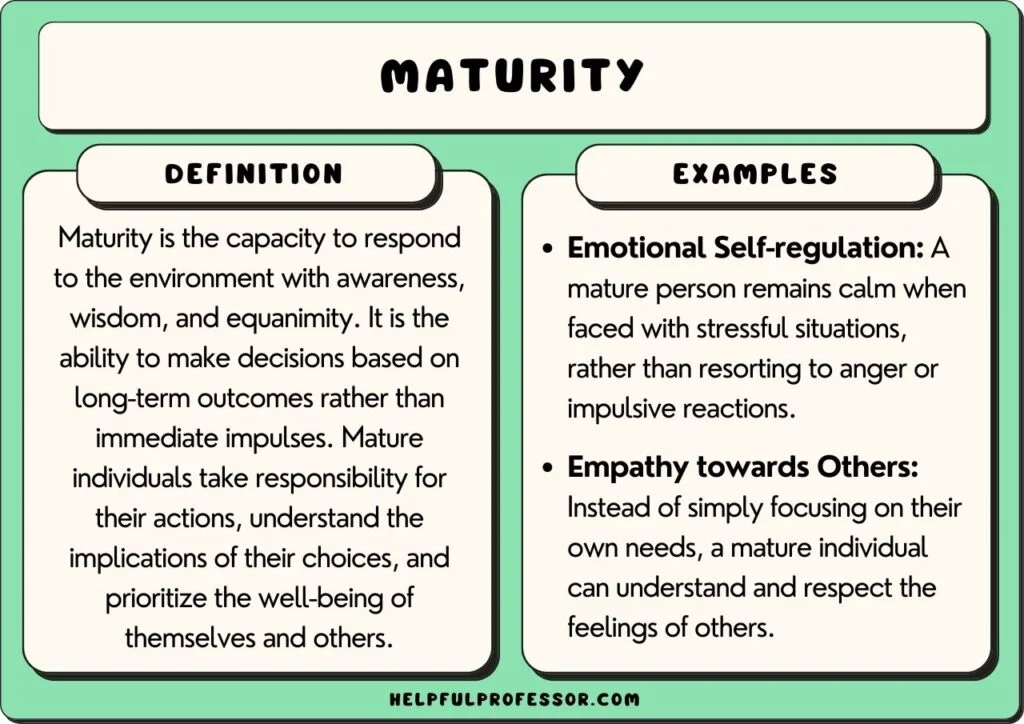The Markers of a Truly Mature, Wise Person
Maturity rarely arrives as suddenly as physical growth milestones. Cultivating personal wisdom through conscious introspection, accountability, expanding one’s worldview and regulating emotions represents a gradual journey of character development. Mature Person is the true gentle men sign.
This guide outlines the defining attitudes, priorities and behaviors setting genuinely mature, growth-oriented individuals apart from the reactive, stagnating masses according to psychologists. While imperfect beings to varying degrees, emotionally mature persons exude recognizable traits like responsibility, thoughtfulness, curiosity and self-discipline that testify to their life experience.
What Does It Mean to Be Mature?
Clinical and developmental psychologists alike reference maturity regarding the demonstration of personal capabilities like:
- Self-control
- Discipline
- Responsibility
- Accountability
- Thoughtfulness
These reflect wisdom applied through emotional regulation, deliberate decision-making, reliability and introspection. Imbalances risk recklessness, impulsivity and underdeveloped adult capacities.

Additionally, social maturity involves respect, empathy and consideration towards others. Self-absorption being the norm today, humble self-awareness appears increasingly rare. However, introspection remains key for personal growth.
8 Defining Signs Displaying Emotional Maturity
While coming naturally to some through devoted self-work, certain learned behaviors characterize authentic maturity, including:
1. Accountability for Mistakes
Immaturity manifests in perpetual finger-pointing, refusing ownership. Though pride initially challenges accepting fallibility, mature persons acknowledge their errors. Public figure Jarrid Wilson exemplified this during a controversy:
“I am sorry…I blame only myself for placing myself in situations where wisdom should have prevailed.”
2. Constructive Response to Stress
Difficult emotions need not control one’s reactions. Mature individuals pause amid frustration, regulating anger through conscientious breaths while seeking solutions. This discipline distinguishes maturity.
3. Decision-Making Guided by Principles
Immature people follow fleeting impulses heedlessly. The mature establish their values and align choices accordingly. When struggling over a decision, the question “Does this match my principles?” provides clarity.
4. Self-Motivated Self-Improvement
Mature persons recognize their continual need for self-improvement, regularly reading personal development books to nourish emotional and spiritual health. By contrast, stagnant individuals resist examining themselves.
5. Patience and Understanding
Maturity tames tendencies to snap judgements through empathy, that imaginative leap into the feelings and experiences of another. Open-minded listening and asking thoughtful questions conveys support.
6. Responsible Self-Management
Organizing finances responsibly, making doctor’s appointments, fulfilling work duties, and managing households display maturity twice as much as quick-wittedness, per a Harvard study. Regrettably, too many refuse the duties of independent adulthood today.
7. Willingness to Admit Imperfection
Intellectual humility characterizes the mature, readily conceding the limits of their knowledge and flaws. Conscientious individuals actually feel relief acknowledging their humanity.
8. Adaptability and Desire to Keep Learning
Maturity answers fears of the unfamiliar with flexible optimism and growth mindsets. With childlike wonder, mature adults understand that even at advanced ages, fresh knowledge and character-enhancing experiences exist through the increasingly freeing recognition that they alone chart their evolution.
While largely internally cultivated, maturity blooms through modeling and interactions with fellow seekers of wisdom equally committed to introspection and self-betterment above fleeting distractions. Therein resides the key to societies where emotional intelligence and stability flourish.
Signs of Immaturity: Behaviors to Avoid
Common indicators of lingering immaturity according to psychologists include:
- Blaming others for personal failures and irresponsibility
- Reactivity and impulsiveness guiding decisions
- Embracing victim mentalities to evade ownership
- Stagnation – refusing personal development or learning
- Attention-seeking behaviors demanding praise/affirmation
- Refusal to acknowledge positional power and authority structures
These manifest emotionally volatile, unreliable and narcissistic mentalities.
While maturity unfolds gradually, the choice exists at any age to transcend stagnation through courageous self-examination and incremental steps towards cultivating wisdom. The rewards for doing so remain immeasurable.
Frequently Asked Questions About Maturity
At what age do psychologists believe individuals reach general emotional maturity?
While highly individualistic, according to various clinical studies, the average age at which the final stage of emotional maturity emerges is between 40-45 years old. This punctuates decades of experiences molding self-awareness, regulation skills, judgment and values.
What adverse effects arise from chronic emotional immaturity?
Recurrent negative consequences of emotional immaturity include the erosion of intimate relationships and professional opportunities through impulsiveness and drama, financial instability from poor planning, and mental health issues like depression or anxiety when denied gradual cognitive growth.
Can someone be precociously intellectually mature yet lag emotionally?
Yes, it remains quite common for some adolescents or young adults to demonstrate cultivated ideas, logic and speech exceeding their relatively undeveloped maturity in areas like self-discipline, emotion regulation, responsibility and decision making with long term priorities in mind. The maturation processes differ in timeline.
I welcome any feedback or suggestions on improving this piece covering the distinguishing signs of genuine wisdom and maturity vs stagnating immaturity! Please feel free to ask follow-up questions.

